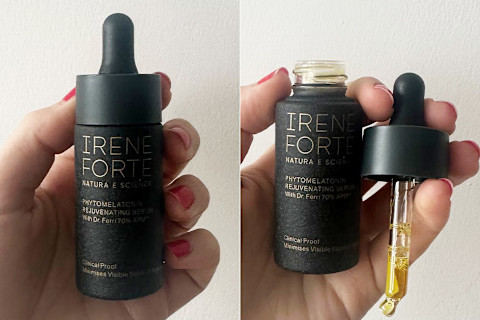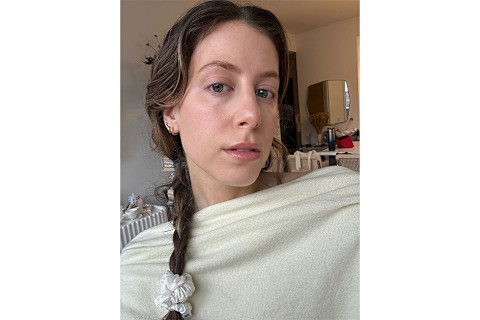I Swapped My Retinol For A Melatonin Serum — Here's What Happened

You simply can't discuss skin longevity without name dropping retinol. In fact, many derms consider it the No. 1 skin care ingredient (honorable mentions to vitamin C and SPF, of course). It promotes collagen production, enhances cell turnover, improves sun-damaged skin, treats acne—I could go on.
The latter is especially underrated, so I decided to use topical melatonin for a month instead of my regular OTC serum. Discover how the replacement measures up below.
First, what does melatonin do for skin?
You may know melatonin as the famous sleepy-time hormone that signals to your brain it's time to wind down—but are you aware it also has powerful antioxidant properties?
As board-certified dermatologist Cynthia Bailey, M.D., founder of DrBaileySkinCare.com, once told mbg about the ingredient, it protects the skin in a series of events called the melatoninergic antioxidative system (MAS)1.
Meaning, not only does melatonin itself stave off free radicals in the skin, but it also forms two other free radical fighters when it breaks down, making it an even more potent and long-lasting antioxidant. Melatonin may even stimulate antioxidant enzymes at the gene level and enhance DNA repair—although researchers are still trying to figure out the exact reason this happens.
On the topical front, melatonin-infused creams have been shown to defend against skin aging2, thanks to the ingredient's antioxidant and DNA-repairing capabilities. And according to Bailey, topical melatonin can penetrate deeply into the skin.
"[It] even penetrates3 into cellular nuclei (where DNA resides), mitochondria (the cells' power generator and regulator of many important cellular functions)," she says. "It also penetrates deeply into the dermis where collagen is lost, [which leads] to wrinkles."
Now, some topical formulas use synthetic, biotech-derived versions of the antioxidant to closely mimic the melatonin in your own body, but research shows4 melatonin sourced from plants (called phytomelatonin) can have similar effects.
The serum I used, Irene Forte's Phytomelatonin Rejuvenating Serum, contains phytomelatonin oil derived from alpine plants notably high in the antioxidant5 (oat, millefolium flower, and sage leaf extracts, to be exact) at a whopping 70%. The remaining 30% consists of vitamin E, another star antioxidant to protect skin and temper inflammation.

Wait: Does topical melatonin make you sleepy?
My experience & results
Honestly, my skin and I were in a very good place before starting this experiment. I had a skin cycling routine down pat: One night of exfoliation (usually with a mandelic acid-infused solution), two nights of retinol, followed by two nights of recovery (i.e., simply nourishing, hydrating products).
The schedule works wonders for my skin, and I generally subscribe to the philosophy if it ain't broke, don't fix it, so I was a bit hesitant before subbing in the phytomelatonin formula. What if it doesn't give me the same glowing results as my beloved vitamin A derivative? But alas, in the name of beauty journalism, I set aside my fears and made the swap for the next four weeks.

And, wow, am I sure glad I did! My skin has a noticeable glow, thanks to phytomelatonin's impressive antioxidant power. The serum is oil-based (yet nongreasy—promise!), so it also has the ability to immediately lock in moisture post-cleanse. I noticed my skin looking so plump and bouncy in the morning, which tells me that the formula worked its magic all night long.
Other people noticed something special too: I had coffee with a friend who told me my skin is so smooth, it looks like I had Botox (I don't). Nothing had changed in my routine except for the melatonin serum swap, for what it's worth.
And you really don't need to glob on too much product—I simply warmed up a few drops in between my palms and pressed them into my skin a few times until well absorbed. A swipe of rich face cream, and that's it!
The verdict
So, would I recommend using phytomelatonin over retinol? The truth is I only have good things to say about both ingredients. If you have a retinol you adore, feel free to keep using it! But if you've never been able to tolerate the notoriously finicky ingredient, you're in luck—phytomelatonin provides similar skin-supporting benefits with no common side effects.
Personally, I will 100% continue to use the melatonin serum, but I'll probably go back to retinol after a few more days. It's one of the most well-documented ingredients for restoring and promoting collagen, and my skin tolerates it—I'd like to keep it on rotation for the time being!
That said, phytomelatonin actually complements retinol quite well, Irene Forte (founder of the namesake brand) tells me, so I don't necessarily have to pick and choose.
My skin cycling routine now proceeds as follows: one night of exfoliation, two nights of retinol, two nights with phytomelatonin, and one night of "recovery." Technically, the melatonin does count as recovery, as it's not promoting cell turnover or "wounding" the skin in the hopes of stimulating collagen production; still, I do like to have at least one night of the week to cut potent actives entirely and focus solely on hydration.
And if for some reason my skin freaks out from a retinol I'm testing? I'll for sure swap in a melatonin-infused number—that way, I can keep up with a healthy aging routine without worrying about compromising my skin barrier. Win-win.



